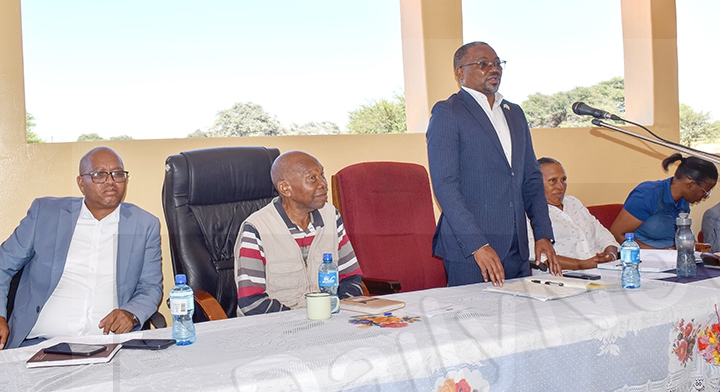Masisi prioritises women empowerment
31 Mar 2023
Achieving the goal of equal participation of women and men in decision making processes has been a challenge for many nations, Botswana included.
United Nations Sustainable Goal number five, speaks about Gender Equality; a fundamental human right and a necessary foundation for a peaceful, prosperous and sustainable world.
Although progress has been made in some quarters, a lot remains to be achieved.
When President Dr Mokgweetsi Masisi took over the Presidency in 2018, he made it his mission to prop participation of women in decision making processes.
Under President Masisi six of the seven women who form the 12th Parliament were made part of Cabinet: three full ministers and three assistant ministers.
By the powers vested upon him, President Masisi appointed four women, Ms Beauty Manake, Ms Peggy Serame, Ms Philda Kereng and Dr Unity Dow as specially elected Members of Parliament and in turn elevated all to Cabinet albeit Dr Dow relinquishing the post in 2020. Initially, Ms Serame was appointed Minister of Investment, Trade and Industry but went on to replace Dr Thapelo Matsheka at the Ministry of Finance. This earned Ms Serame the title of first female finance minister.
Another first for women under President Masisi’s leadership was that of the University of Botswana chancellor, that he bestowed on former Bank of Botswana governor, the late Ms Linah Mohohlo in 2018.
Sadly, Ms Mohohlo passed on in 2021 and yet another female in Ms Tebelelo Seretse, ascended the post.
Botswana Open University also gained a female chancellor, Professor Sheila Tlou. A former Cabinet minister, her appointment is from 2021 to 2026.
In 2021, Ms Jeanette Makgolo was appointed Botswana Unified Revenue Service – commissioner general for a period of five, elevating the number of women in positions of power.
Again in 2021 the nation witnessed the swearing in of Judge Tebogo Tau as the country’s first woman president of the Court of Appeal (CoA).
In addition to that the country also observed an increase in the number of women justices at the CoA as the appointment of the first female inaugural Registrar of the Competition and Consumer Tribunal.
Former Deputy Commissioner of the Botswana Police Service, Ms Dinah Marathe assumed the position of Commissioner of Botswana Prisons Service, becoming the first woman at the helm of the organization.
Having served in the BPS for many years, Ms Marathe brought a wealth of experience in her new responsibility to provide guidance and mentorship as well as ensuring safe custodial care, rehabilitation and reintegration of prisons.
She is yet to introduce an internal police unit within the BPS in an effort to improve security at the prison facilities.
Furthermore, President Masisi appointed Ms Emmah Peloetletse as Permanent Secretary to the President, a position previously held by Mr Elias Magosi.
Since independence the position of PSP has been dominated by men, making Ms Peloetletse the first woman to hold the position.
“This is commendable and a step in the right direction,” said the founder of Ntsabane Gender Based Violence Association, Ms Keabonye Ntsabane.
She said the civil society had long been advocating for more women participation in decision making but the government had been slow to heed their call, commending government of the day for having women’s best interests at heart.
Not only does the country recognise gender equality as central to socio-economic, political and cultural development, Botswana also made major strides in addressing issues of Gender Based Violence (GBV) under the guidance of President Dr Masisi, and the include the introduction of Child Friendly Service Centres, establishment of a Gender and Child Protection Branch, establishment of the Gender and Child Protection Unit and establishment of specialised courts to speed up hearing of GBV cases as well as establishment of inter-ministerial committee on GBV.
Due to growing concerns over GBV cases countrywide, the judiciary and law enforcement agencies also adopted a policy discouraging withdrawal of reported GBV related cases.
Furthermore the country introduced Gender Based Violence Perpetrators Programme to assist offenders who committed GBV offences by facilitating a positive life free of crime upon release from prison.
In addition to addressing GBV issues, the country went on to facilitate gender mainstreaming in the public sector with Ministry of Agriculture becoming the first ministry to develop the sector gender mainstreaming in agriculture.
As a gender activist, Ms Ntsabane acknowledged that the government had made positive strides to address GBV. Ends
Source : BOPA
Author : Kgotsofalang Botsang
Location : SELEBI PHIKWE
Event : Interview
Date : 31 Mar 2023




